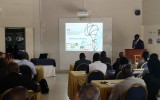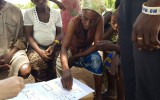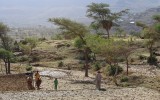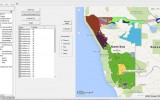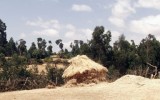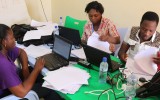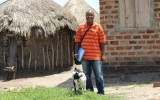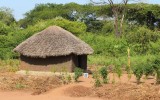Policy and programme design
Showing items 1 to 15 of 16
View Categories
- Areas of expertise
- Capacity building
- Climate change
- Data
- Disasters and emergencies
- Famine prevention and food security
- Gender
- Income diversification
- Inequality
- Lake Victoria fisheries
- Livelihood resilience
- Livelihood Zones
- Livelihoods
- Monitoring and evaluation
- Nutrition and health
- Open source
- Policy and programme design
- Post-conflict
- Poverty research
- Refugees and displacement
- Social protection
- Technology
- Urban
- Vulnerability assessment
- Countries
- Hydromet
- Methods
- Resilience
- The organisation
-
Integrating hydro-climate science into policy decisions for climate-resilient infrastructure and livelihoods in East Africa
Hon James Acidri MP Keynote speech from the HyCRISTAL project meeting on 21 May 2019 in Kampala, Uganda In Kampala, we are now in our first rainy season, but these are not the rains that we used to know particularly in my own district, Maracha-West Nile region. Four years ago, the HyCRISTAL project was launched […]
-
Considering the health sector as an important user of Hydromet information
In September, I was able to attend the AMCOMET, African Ministerial Conference on Meteorology, forum in Addis Ababa. The focus of the forum was Weather, Water, and Climate Services, and the contribution of these ‘hydromet’ services to wider social and economic development is becoming increasingly evident as the reality of climate change hits both urban […]
-
Banking on Evidence for Development – a month in the life of a volunteer
It’s August 2013 and I’m about as broke as a ‘banker’ in London can be. I had eagerly taken up my first position in the big city: interning at RBS’ risk department. That’s right, I had made it to the big time… And then rent happened… And bills… So with accrued holiday time but no […]
-
New HEA software developed by Evidence for Development
The household economy approach (HEA) is a method for assessing the vulnerability of rural populations to economic shocks and changes, based on their livelihood patterns and market information. It is now widely used as a method of famine early warning by many governments and humanitarian agencies, and also has important applications for managing the impacts […]
-
Postcard from Ethiopia: How to measure our impact
As an economist, I have always found it logical that NGOs should be expected to demonstrate the impact of their work. Once we have set our objectives, we need to know whether we are achieving them and how we might do better. That means measurement. At Farm Africa, we support smallholder farmers to increase their […]
-
Baseline assessment of Malian refugees in Burkina Faso, Part II: Qualitative social and economic study (2014)
No single research methodology can fully explain why some households prosper in new and challenging situations while others do not, and nor can a single method answer fundamental questions relating to the underlying drivers of change within communities. This report complements the baseline study of household economies of Malian refugees in Burkina Faso , providing additional social and contextual information from Sag Nioniogo, Goudebou and Mentao refugee camps to support programming decisions.
-
Livelihood baseline assessment of Malian refugees in Burkina Faso: Quantitative analysis of household economies (2014)
This assessment was undertaken on behalf of UNHCR to provide baseline information on the livelihoods of Malian refugees in Burkina Faso, to identify opportunities for greater economic self-reliance, and to highlight risks and vulnerabilities of specific groups within the population. This report covers the three official refugee camps in Burkina Faso: Sag Nioniogo, Goudebou and Mentao.
-
Mobile data, measurement & evidence… what’s new?
As mobile data collection in remote regions and developing countries becomes more viable for development organisations, the robustness of the methodologies used must be considered in relation to the goal of evidence-based development. Expanded possibilities According to the UN International Telecommunication Union, “by the end of 2014, 55% of all mobile-broadband subscriptions are expected to […]
-
The Household Economy Approach: Managing the impact of climate change on poverty and food security in developing countries (2014)
Also available at: http://www.sciencedirect.com/science/article/pii/S221209631400031X
-
Oiling the relationship between evidence and policy: prioritising data quality and integrity
LSE’s recent JSRP conference on politics and evidence in international development highlighted problems inherent in the ways ‘evidence’ tends to be defined and used in mainstream development discourse and practice. How can Evidence for Development’s individual household method (IHM) and current involvement in the ‘Assessing Rural Transformations’ project inform the discussion and help to oil […]
-
When evidence isn’t clear
Practical and reliable estimates of wealth and poverty are becoming increasingly important as more countries introduce social protection systems, and as development programmes place a greater emphasis on targeting. However, there is not yet a widely-accepted ‘gold standard’ measuring method – and in the absence of this, it is difficult to assess the relative merits of […]
